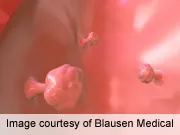Colonoscopy, sigmoidoscopy and even fecal blood testing all lower risk of cancer death
WebMD News from HealthDay

By Dennis Thompson
HealthDay Reporter
WEDNESDAY, Sept. 18 (HealthDay News) -- People are less likely to die from colon cancer if they use any of the currently recommended screening procedures, a pair of new long-term studies reveal.
Colonoscopy remains the most effective screening tool, reducing the risk of colon cancer death by 56 percent, according to new data published in the Sept. 29 issue of the New England Journal of Medicine.
Two other recommended screening methods, however, also greatly reduce colon cancer mortality, the researchers found. Flexible sigmoidoscopy provides a 40 percent lower risk of dying from colon cancer, while annual fecal blood testing offers a 32 percent reduced death risk.
"The inclusion of all these tests in the guidelines of major organizations continues to make sense," said Dr. Durado Brooks, director of prostate and colorectal cancers for the American Cancer Society. "Quite honestly, many patients don't have access to colonoscopy or are not willing to undergo a screening colonoscopy. Many studies have shown that offering patients options will increase the likelihood that they will complete some form of screening, and that is what is most important."
The results come from a pair of studies testing the long-term health benefits of screening for colon cancer.
The first study investigated the use of colonoscopy and flexible sigmoidoscopy among a group of almost 89,000 health professionals during a 20-year period.
Colonoscopy uses a thin tube equipped with a camera to examine the entire length of the colon in a procedure for which patients are usually sedated. Flexible sigmoidoscopy is a similar procedure but with a shorter tube that examines less of the colon, so patients do not have to be sedated.
The study found colonoscopy was more effective in preventing cancer throughout the entire colon, but that both procedures greatly reduced the overall risk of colon cancer death, said Dr. Andrew Chan, an assistant professor at the Massachusetts General Hospital Gastrointestinal Unit and the co-senior author of the report.
"Colonoscopy was superior to flexible sigmoidoscopy in terms of reducing the risk of colon cancer throughout the colon," Chan said. "But this study really does support the existing guidelines and recommendations for individuals to undergo screening with either colonoscopy or sigmoidoscopy. I think this study shows there's a very real impact on the risk of developing cancer and dying of cancer."
The second study focused on the fecal occult blood test, which uses chemical agents to detect trace amounts of blood in a person's stool.
Researchers led by Dr. Aasma Shaukat of the VA Medical Center and University of Minnesota, Minneapolis, followed up on more than 46,500 Minnesotans who had been randomly assigned either to undergo fecal testing every year or every other year, or receive no testing. The research ran from 1976 through 1982 and from 1986 through 1992.
source : Colon Cancer Screenings Work, Twin Studies Report








